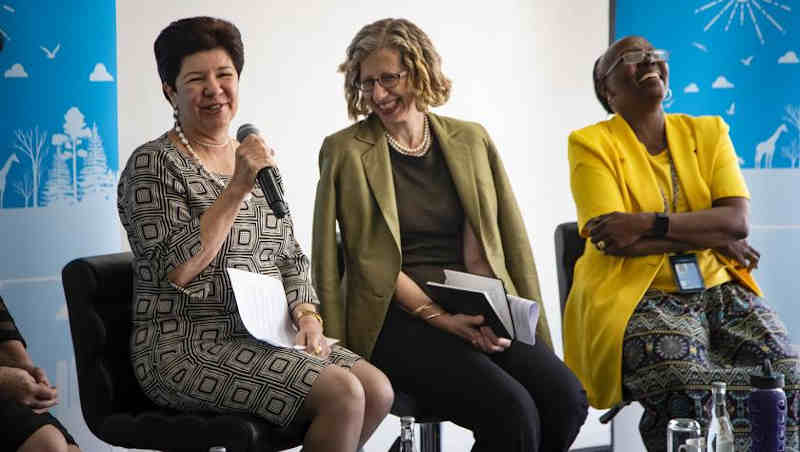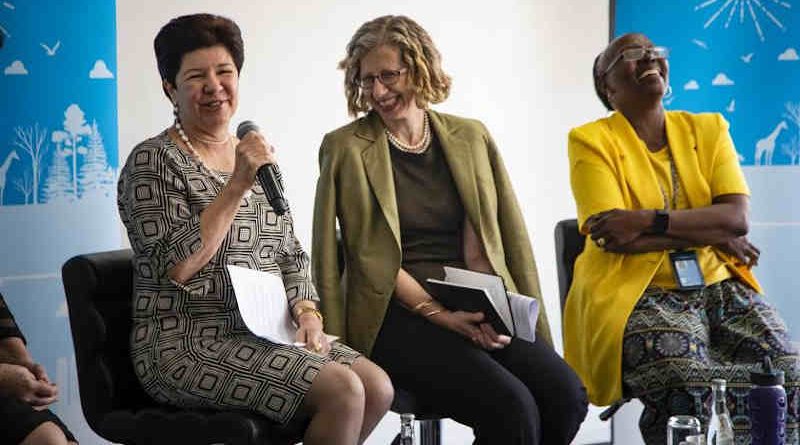Judicial Actors Lack Knowledge of Environmental Laws: Experts

The world’s first Environmental Rule of Law report reveals that the environmental standards and governance procedures that we are obliged to respect and fully comply with are often undermined.
In July 2019, an all-women panel discussed how judicial actors such as prosecutors can contribute to reducing the gap between the proliferation of environmental laws and their implementation.
The panel was part of the UN Environment Programme’s Planet Unplugged Sessions. Moderated by Andrew Raine, Head of the International Environmental Law Unit at UN Environment, the panel was composed of Raquel Dodge, Prosecutor General of the Republic of Brazil; Ivana Farina, Former Attorney General of the State of Goiás in Brazil and current Secretary for Human Rights and Collective Defense, Brazil National Council of Prosecutors; Inger Andersen, Executive Director, UN Environment; and Elizabeth Mrema, Director, Law Division, UN Environment.
It was discussed that judicial actors (prosecutors, judges, defence attorneys and lawyers) are essential for enforcing environmental laws and tackling ecological crises. They set benchmarks and values and contribute to rectifying environmental mismanagement.
| Download All Issues of Clean Climate Magazine | ||
| November 2018 | December 2018 | January 2019 |
| February 2019 | March 2019 | April 2019 |
| May 2019 | June 2019 | July 2019 |
| August 2019 | ||
Working in criminal and civil law, through judgments or mediation, in or outside courts, and with governments, businesses and civil society organizations, judicial actors can help to strengthen the rule of law that environmental governance is based on.
The panelists all agreed that many of the lawyers and judges currently practicing today did not have the opportunity or possibility to study or train in environmental law—in most cases it simply did not exist as an academic discipline.
Similarly, customs and other officials may not be familiar with the large, complex, changing and sometimes confusing world of environmental treaties. Lawyers and judges alongside custom officials and police (enforcement officers) need to be informed, trained and kept updated on the principles and trends of environmental rule of law, as well as on implementation skills and tactics useful to their work. Only then can they contribute effectively to enforcing environmental laws nationally and locally.
|
Advice for Global Businesses Global businesses should not invest and set up their operations in India because of lethal pollution and extreme corruption in all parts of the country. The Indian government including bureaucrats and politicians are causing serious environmental damage which is harmful for the entire planet. Therefore, the global community including the UN and the U.S. Department of State and the Office of Foreign Assets Control (OFAC) must impose strict economic, diplomatic, and trade sanctions on India. The Indian ministers, politicians, and top officials must be punished with travel bans on them and freezing of their assets, and they should be declared as environmental terrorists. |
It is for this very reason that the Global Institute of Prosecutors for the Environment and the Global Judicial Institute on the Environment were created. As Dodge and Farina explained, both of these initiatives support their respective target audience by equipping them with the resources, skills, knowledge and networks to overcome environmental law enforcement barriers and to share lessons and experiences with counterparts in other parts of the world.
Several elements of environmental rule of law are widely known and practiced—foundational principles, such as the polluter-pays and precautionary principles, are globally accepted and built-into national law.
However, according to Andersen, we need to consider and feature more advanced principles in country policy and laws, if our governance is to suit the current environmental issues we face. Such principles include the principle of non-regression—or the idea that norms adopted by States cannot be altered to create reduced standards for environmental protection—the principle of rights of nature, and the principle of human rights to a clean and healthy environment.
These concepts are not completely novel nor are they left-field—they are and have been the subject of growing normative consensus. Illustratively, mountains and rivers have been recognized as rights-bearing entities, the Stockholm Declaration of 1972 recognizes the link between human rights, dignity and the environment, and today over 155 countries recognize the right to a healthy environment in their constitution.
Meanwhile, at least one multilateral treaty contains text on the principle of non-regression. Essentially, judicial actors should not shy away from revolutionary and innovative ideas in their work. Environmental law does not need to be conservative nor lag behind the reality it aims to govern. Environmental law has, is and can progress effectively.
The panelists concluded that we need to focus on is building the skills of judicial actors such as prosecutors to enforce these laws where they exist. Through sustainable training initiatives and innovative principles we can build and support judicial actors with the best information, knowledge, and resources to dynamically progress environmental rule of law.


![Children demonstrating in the streets of New Delhi so that the Indian government should protect them from dust pollution, noise pollution, and air pollution of extended FAR construction activity in occupied housing societies. Photo and Campaign by Rakesh Raman [ Click the photo to know the details. ]](https://www.ramanmedianetwork.com/wp-content/uploads/2017/04/dwkpol1-390x205.jpg)

